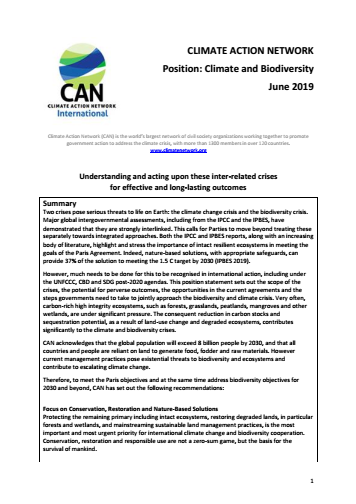CAN Position: Climate and Biodiversity, June 2019

Two crises pose serious threats to life on Earth: the climate change crisis and the biodiversity crisis. Major global intergovernmental assessments, including from the IPCC and the IPBES, have demonstrated that they are strongly interlinked. This calls for Parties to move beyond treating these separately towards integrated approaches. Both the IPCC and IPBES reports, along with an increasing body of literature, highlight and stress the importance of intact resilient ecosystems in meeting the goals of the Paris Agreement. Indeed, nature-based solutions, with appropriate safeguards, can provide 37% of the solution to meeting the 1.5 C target by 2030 (IPBES 2019).
However, much needs to be done for this to be recognised in international action, including under the UNFCCC, CBD and SDG post-2020 agendas. This position statement sets out the scope of the crises, the potential for perverse outcomes, the opportunities in the current agreements and the steps governments need to take to jointly approach the biodiversity and climate crisis. Very often, carbon-rich high integrity ecosystems, such as forests, grasslands, peatlands, mangroves and other wetlands, are under significant pressure. The consequent reduction in carbon stocks and sequestration potential, as a result of land-use change and degraded ecosystems, contributes significantly to the climate and biodiversity crises.
––
Download file: http://can_position_climate_biodiversity_june_2019-1.pdf

